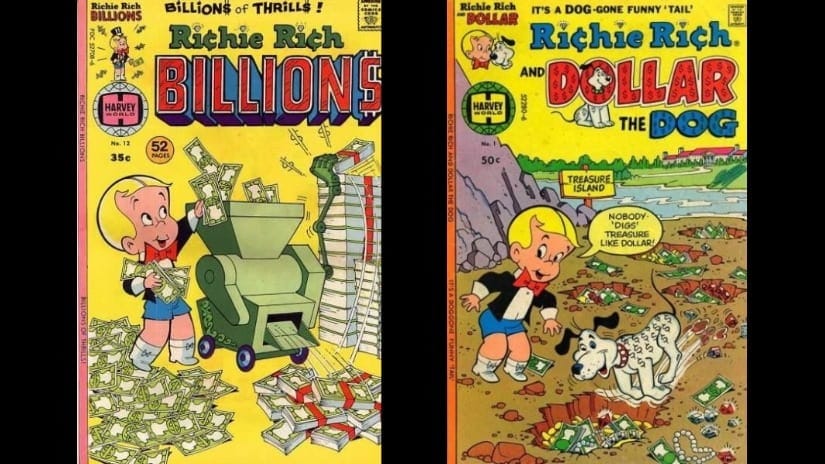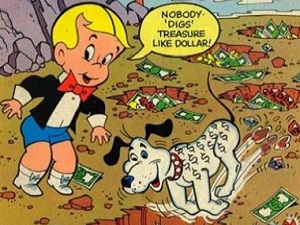In this monthly column, Jai Arjun Singh scours through his bookshelves to pick out titles that have impacted him at various times in his life. Read more from the series
here . *** The books we read often become inseparable — in our memory — from the circumstances and settings in which we encountered them. This is sometimes less true for a large series — or a number of works by the same author in the same genre — where the mind blurs many separate reading experiences together. But not always. For instance, I read many Agatha Christies as a child, but no memory is as vivid or scary as experiencing Murder in Retrospect (a.k.a. Five Little Pigs) in a dimly lit room during a Ludhiana trip when everyone else in the house was asleep. Along similar lines, it feels like my entire brush with Richie Rich comics took place over an intense reading glut spread over a few days, and (though I didn’t realise it then) in a very apt environment: a luxurious duplex apartment on the top floor of a Bombay skyscraper. There are many gaps in this recollection, but here’s what I know: sometime in mid-1987, my mother, her mother and I were in Bombay. (This may well be the last time that my mother visited the city she had been brought up in and loved dearly, but that’s another story.) My nani being in the process of selling her Andheri flat, we stayed in the residence of a kindly acquaintance whom I was meeting for the first time (and whom, as far as I recall, I never met again) — a corporate heiress of some sort. I’ll unimaginatively call her Aunty A. It was a lazy summer, and much of my time was spent bouncing a tennis ball on the walls of our room, occasionally watching films like Qurbani and Insaaf Kaun Karega on VCR in the evenings, or following the progress of the little tortoise kept as a pet in a makeshift terrace pond. Then I discovered a guest-room, the shelves of which were lined with around a dozen thick, red, bound books. Each of these contained at least fifteen 30-page Richie Rich comics — which, at a conservative estimate, means 5,000-odd pages. [caption id=“attachment_6726761” align=“alignnone” width=“825”]
 Covers for Richie Rich comics[/caption] So I read and read and read, enthralled by Richie’s adventures with his resourceful butler, the dog with the dollar signs on its back, the robots and super-computers and brilliant scientists and absentminded professors and snooty cousins that populated the Rich Estate. There were enormous orange sweets in a jar in the guest-room, each of which lasted close to an hour if you kept them in your mouth and let them melt slowly; to date, if I think of a Richie Rich comic I feel the tangy sensation of those sweets. It felt like an endless dream, though it probably only lasted a week or so. It was the plushest residence I had stayed in (was it Nariman Point? Pali Hill?) and there was something almost like self-parody in this endless procession of Richie Rich-es and nothing else to read (at least for a child). In my mind’s eye, Aunty A — plump, fair and smooth-skinned, seemingly always dressed in flowing kaftans, even when presiding over business meetings in her apartment — looks a great deal like Richie Rich’s mother, though I’m fairly sure I made no such connection at the time. If you’re the sort who gets easily indignant — and
worries about children being exposed to the wrong influences — the Richie Rich world has many things that can be objected to (notwithstanding its central conceit that the protagonist is a “poor little rich boy”, embarrassed by all the attention, happiest when having a good time with his “simple” friends). I wonder sometimes about the appeal — escapist or forbidden — that these comics must have had in a country with a soft-socialist history. They weren’t so much an unabashed celebration of capitalism as a goggle-eyed ode to a sort of demented-capitalism-on-drugs where one had so much wealth — in so many forms — that one couldn’t realistically do anything but arrange it in many pretty ways. And perhaps the best example of this was in a comic I recently rediscovered, in which Richie and his parents go on a picnic to the “richest place in the world” — which, needless to say, is on their own estate, a short ride away by a special “heli-camper-yacht”. On reaching, the senior Mr Rich shows his gaping family exactly what makes this place special: mountains made of solid gold and silver, a volcanic oil well that also throws up gold nuggets, giant oysters that cough up giant pearls on the shore. They are about to settle down to eat (and I am half-expecting the sandwiches to have rubies stuffed in them) when a gang of robbers shows up and starts looting things. [caption id=“attachment_6726731” align=“alignnone” width=“825”]
 Richie Rich and his parents go on a picnic to the “richest place in the world”[/caption]
I wonder sometimes about the appeal — escapist or forbidden — that these Richie Rich comics must have had in a country with a soft-socialist history. They weren’t so much an unabashed celebration of capitalism as a goggle-eyed ode to a sort of demented-capitalism-on-drugs where one had so much wealth — in so many forms — that one couldn’t realistically do anything but arrange it in many pretty ways | Jai Arjun Singh writes in his monthly column #MyBookshelves
Advertisement
End of Article


)
)
)
)
)
)
)
)
)



